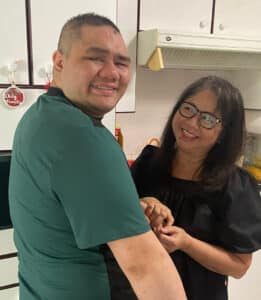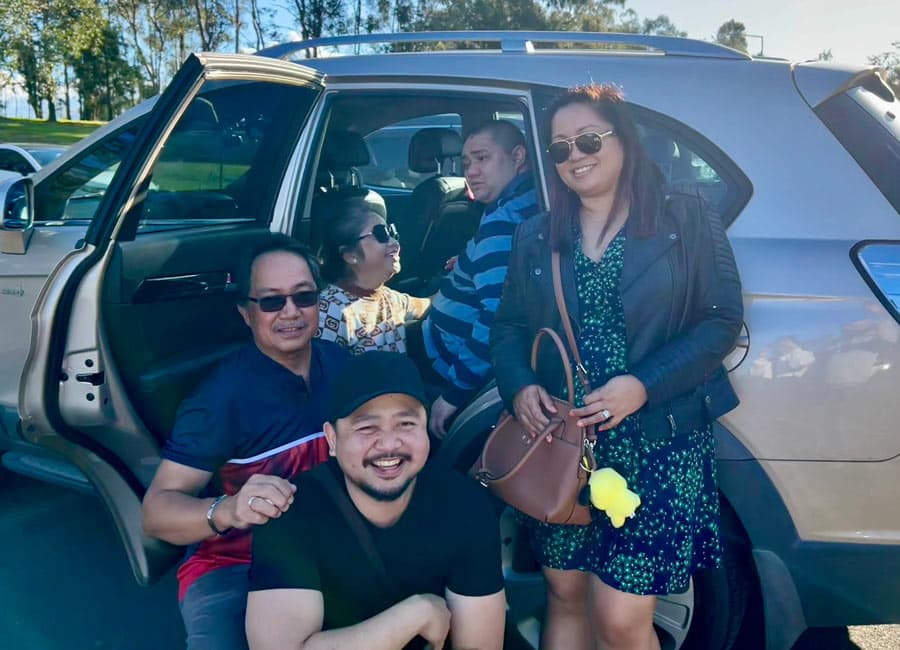It’s important for carers to know they are not alone, after all, there are more than 2.65 million carers in Australia! They all have hopes, challenges, happiness, sadness, frustration, and success in their role. We met up with Jocelyn to talk about her journey as carer, supporting her son Kristian who is an Afford resident. We are sharing Jocelyn’s story as part of National Carer Week.
Pictured: Kristian’s family join him for a drive
Jocelyn and her husband Gary care for their son Kristian, who lives with autism, intellectual disability, and vision impairment. Their story is one that illustrates the importance of support networks and making time for wellbeing when life gets tough.

Pictured: Kristian and Jocelyn
How did you become a carer?
Kristian was born in 1992. At first his development was very normal. He was responsive, he liked watching Sesame Street and he started babbling some words. Then one day he just stopped, and I heard nothing more. It was a puzzle to me. As a mum, I felt guilty. I went back to work five months after Kristian was born and he had been jumping from one child carer to another.
I felt it had been traumatic for him, like, did I do wrong by going back to work? He didn’t progress after that, and I watched him struggle to communicate what he was feeling and what he wanted. I went to so many doctors, so many specialists, just to find out what was wrong. No one could help me. Not even the doctors in The Children’s Hospital, who said ‘oh, he is just delayed.’ I waited and waited and went to other specialists and they really couldn’t find anything. One specialist said “Mrs Diaz, you may even know more than we do.” Then finally, one doctor I privately consulted said Kristian has autism.
Autism wasn’t as well known then, so information was sparse. I didn’t know where to start. And the therapies were not readily available unless you had a lot of money. That’s when I started researching on the topic and doing everything I could. At the time, government support was limited. They would bring you in for three sessions to train you and that’s it. As well as autism, Kristian has a moderate intellectual disability.
He lived at home with us until the age of 25 when he moved into the independent living home. Even at that age, I was struggling to let him go. But we had to do it because what would happen to Kristian if we weren’t there to care for him? He must get used to other environments apart from our home. It was a big decision, but people reminded me, “Jocelyn, it’s not for you, it’s for Kristian.”
What does life look like now?
Well, it was a slow transition for Kristian to move into his home. We started with just weekends, and I think that went on for a year before he moved in. He’s okay now he has adjusted. He comes home to us every second Saturday, and on alternate Saturdays we go to his house to pick him up and take him out. We do still have those moments where he doesn’t want to go back after he comes to our house, or when we take him home, he will cling to us as we try to leave. He’s getting a little better if he’s got the support staff he trusts there.
Kristian’s routine is very important to him. One of the hardest things during COVID lockdowns is that he didn’t understand the disruption to his routine. Facetime helped but not enough to facilitate Kristian’s longing for his family. Not being with his family was his biggest hurdle during lockdowns and it triggered his self-harming behaviour quite severely. He was feeling isolated and frustrated with not being able to communicate.
When he resorted to self-harm, he primarily targeted his eyes, which led to loss of his vision after two months. So, Kristian is now having to adjust to life without sight.
We also struggle a bit whenever staff turnover happens because the impact on Kristian is huge. Routine is the only way for him to have a sense of control in his surroundings, which provides him the feeling of security. But he is blessed that he has four long-term staff at his house he truly trusts and feels secure around. The process of transitioning new staff has helped Kristian cope with the inevitable changes in a supported home.
Though Kristian doesn’t like it, he is familiar with the process, and he is able to demonstrate whether he can or cannot work with certain staff. It also helps that he’s got a very good behaviour consultant who has been with him for years and is excellent with all his plans. He understands Kristian to a ‘t’. These plans help the staff immensely in understanding Kristian. Having a behaviour consultant who truly gets Kristian’s personality is like a having a key that opens the door to all positive avenues.
What support do you have as a carer?
On top of Kristian’s challenges in life, the recent loss of vision was the final straw for me. After decades of always aiming for the best for my son, I was just starting to see a level of achievements for him. And then circumstances surrounding the pandemic caused his loss of vision.
For months, I was seeking for answers to what caused this. How did it get to this? Could it have been avoided? Who do I blame? I started to see a psychologist because I was spiralling down, worrying about what he is thinking and feeling now because he can only understand so much.
My GP said I need to see the psychologist for my wellbeing, and for Kristian. As I began to accept the situation, I am slowly overcoming the overwhelming depression, always putting Kristian first, telling myself, my son needs me now more than ever. Having a psychologist’s support plays a solid role in getting us back on our feet. Their guidance is crucial when we are at our lowest, when we have that feeling that everything is already an endgame. Best of all, Kristian is benefiting as we are now at the stage of fully getting him out in the community again… just this time, without his vision.
I won’t accept seeing a very opposite version Kristian from cheerful and always wanting to be out, to him staying in his bedroom with no motivation to do anything at all. He went through the initial stage of not wanting to eat and drastically lost so much weight. Now after being able to get him out again, we are back to him looking forward to our long drives and short lunches in the park, his appetite is back and gaining his weight back rapidly which we are keeping an eye on since he is also diabetic.
What is your relationship like with Kristian?
Kristian is a very sweet, gentle boy who I see is trapped in high sensory sensitivities that often lead to behavioural challenges. As a mother, I provide him with understanding and make him feel that no matter what, I am always with him in his struggles. There is a notion that people with some types of disability, particularly those who are non-verbal, have no understanding of what they are told. I am very strong in my belief that regardless the complexities of their disability, each one of them can understand what’s being communicated.
With Kristian, from day one, I never stopped talking to him. Whether I get an answer or not, I continuously converse with him just like a regular conversation with anyone. It is through this that Kristian gets to understand a lot. He may not appear to comprehend but he does.
He’s very strong in sensing people, he knows whether the person is to be trusted or just being ‘nice’. If people take the time to observe and get to know him, they will see how loving he is and considerate with others’ feelings. He is quite patient if you explain a situation to him. These are the things that I always emphasise with his carers.
What are your hopes for the future?
In a lot of ways even though Kristian is living in his own home, we are still carers. It’s very hard for us to take a step back. We want to involve our other children, but we also understand they have lives of their own. That’s why we are trying our best for Kristian to be familiar and comfortable in his own home, and for him to consider them as family. We strive to provide him with a home he deserves, one that meets his needs appropriately. Kristian is learning to live this way of life. He now has the understanding that he has two homes, two families. He will be forever present in our family who are going to be there for him for all times.
What message would you share with other carers?
To all my fellow carers, our road is long, narrow, and full of challenges. But focussing on our loved ones with unwavering love will give us strength we are not even aware we possess. Our presence can provide them with a feeling of security, being loved and a sense of belonging. These strengthen them to face the challenges of being away from home, knowing they still have family who will always protect them even if they are now living in their own homes.
I learned from being a carer for 30-plus years to my special son that, as we guide them to their journey of their lives, we should also be looking after ourselves… for them. We should always remember we are the pillar they get their strength from, their inspiration, their very reason why they are fighting their challenges endlessly. One may ask ‘who helps us as we strive our best to help our special loved ones?’
I have asked myself this same question so many times as I went through the roller-coaster of emotions. There are a few support providers out there but because I am quite a private person, I am hesitant to seek certain services for myself. At all times, my number one go-to is my quiet conversation with God. I never failed to ask for guidance for any decisions I make at any time, any place.
At my breaking point when Kristian lost his vision, He gave me a lovely psychologist and now, Kristian and I are on the mend. When desperation and sense of helplessness are constant life, faith is the hand that will catch me for every fall I have.
Running from Sunday 16 – Saturday 22 October 2022, National Carers Week is a time to recognise and celebrate the 2.65 million Australians who provide care and support to a family member or friend. Click here to learn more.
Was this page helpful?
Is there anything missing on this page? Please let us know
Is there anything missing on this page? Please let us know
